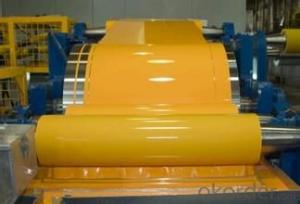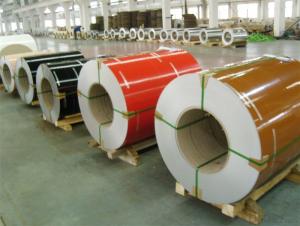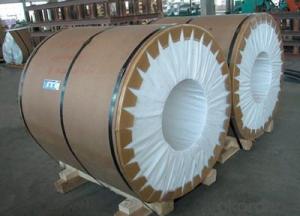Prepained aluminum coil for sandtich panel
- Loading Port:
- China Main Port
- Payment Terms:
- TT OR LC
- Min Order Qty:
- -
- Supply Capability:
- -
OKorder Service Pledge
OKorder Financial Service
You Might Also Like
Aluminium is a relatively soft, durable, lightweight, ductileand malleablemetalwith appearance ranging from silvery to dull gray, depending on the surfaceroughness. It is nonmagnetic and does not easily ignite. A fresh film ofaluminium serves as a good reflector (approximately 92%) of visible lightand an excellent reflector (as much as 98%) of medium and far infraredradiation. The yield strength of pure aluminium is 7–11 MPa,while aluminium alloys have yield strengths ranging from200 MPa to 600 MPa. Aluminium has about one-third the densityand stiffness of steel. It is easily machined,cast, drawn and extruded.
Aluminium alloys (or aluminum alloys; see spellingdifferences) are alloysin which aluminium(Al) is the predominant metal. The typical alloying elements are copper, magnesium,manganese,silicon,tin and zinc. There are twoprincipal classifications, namely casting alloys and wrought alloys, both of which are furthersubdivided into the categories heat-treatableand non-heat-treatable. About 85% of aluminium is used for wrought products,for example rolled plate, foils and extrusions.Cast aluminium alloys yield cost-effective products due to the low meltingpoint, although they generally have lower tensile strengthsthan wrought alloys. The most important cast aluminium alloy system is Al–Si,where the high levels of silicon (4.0–13%) contribute to give good castingcharacteristics. Aluminium alloys are widely used in engineering structures andcomponents where light weight or corrosion resistance is required
Specification:
Alloy: AA1050, 1060, 1100,AA3003, 3005, 3015, 5052, 5754, 5083,8011, etc
Temper:H14/16/18/22/24/32, HO etc.
Thickness:0.2mm—100mm
Width: 100mm—2300mm (Can be slitted)
InnerDiameter: 508MM
Coil Weight:500kg-3000kg(Max.)
Application:Foil stock, Circles, Roofing, Can stock, Marine plate,Anti-slipery purpose in vehicles, packing and appliance.
Features:
1. Excellent quality of products
2. Quick delivery
3. Best service to clients
4. BV,SGS avalible
5. No buckle o waveness
6. Tension leveling
7. Certificate of Origin
8. Form A,E
Packaging Detail:
Carton ,Woodenpallet with plastic protection packing ,standard seaworthy packing or as yourrequest.
ProductionCapacity:
AnnualProduction capacity of 600,000 tons.
Products areexported to United States, Canada, U.A.E, Brazil, Mexico,Thailand, Vietnam,Nigeria etc, over 100 countries andregions all over the world.
Production Line:
CNBM aluminumproduction base is comprised of 18 aluminumannealers, 10 coil and foilmills, 4 continuous production lines, 2hot rolling production line and 3prepainted lines.
FAQ:
1. What is the form of payment?
Normally 30% TT, L/C
2. Type of quotation?
FOB, CFR, CIF
3. Port of loading?
Shanghai port
4. Delivery time?
30 day after client’s deposit
- Q:How do aluminum coils perform under high-temperature applications?
- Aluminum coils are known for their excellent heat resistance and performance in high-temperature applications. Due to their low melting point of around 660 degrees Celsius (1220 degrees Fahrenheit), aluminum coils can withstand and operate efficiently under elevated temperatures. Aluminum has a high thermal conductivity, meaning it can quickly transfer heat away from the coil, preventing overheating and potential damage. This property allows aluminum coils to effectively dissipate heat, resulting in improved thermal management and enhanced performance in high-temperature environments. Moreover, aluminum coils exhibit good corrosion resistance, which is crucial in applications where heat and moisture are present. The oxide layer that naturally forms on the surface of aluminum provides a protective barrier against corrosion, ensuring the longevity and reliability of the coil even in challenging conditions. Furthermore, aluminum coils are lightweight and possess excellent formability, allowing for easy installation and integration into various systems and applications. This versatility makes them suitable for a wide range of high-temperature applications, including heat exchangers, automotive components, HVAC systems, and electrical devices. However, it is important to note that extreme temperatures beyond the melting point of aluminum can cause the material to weaken or deform. Therefore, it is essential to consider the specific temperature requirements and limitations of the aluminum coil before implementing it in a high-temperature application.
- Q:Roll presented above 1 complete circles are brineling put on work roll after the new rolling, less than 12 volumes in the aluminum surface will be presented in the corresponding position of a straight roller, a roller indentation in the above, check the work roll above a pit. Replace the upper support roll for only a few days. Want to know what's going on?Should not be bearing problems, because the bearings have been used for almost 4 years, it should not be bearing problems, and now they are suspected of bending cylinder seal problems, oil seepage phenomenon.
- Substandard products how to leave the factory, if not for external reasons, that is, when the design and installation of bearings, specifically, you find manufacturers to come to repair
- Q:Are aluminum coils suitable for marine environments?
- Aluminum coils are suitable for marine environments due to their excellent corrosion resistance properties. Aluminum has a natural oxide layer that forms on its surface, providing a protective barrier against saltwater corrosion. This makes aluminum coils highly resistant to rust and deterioration caused by exposure to marine conditions. Moreover, aluminum is lightweight, making it a preferred choice for marine applications where weight reduction is essential. Additionally, aluminum coils offer good thermal conductivity, which is beneficial for dissipating heat in marine cooling systems. Overall, aluminum coils are a reliable and durable choice for marine environments, ensuring long-lasting performance and minimal maintenance requirements.
- Q:Other than alloys. I'm trying to think of a way I can make an aluminum knife that will hold an edge. One group of researches say they used 60 metric tons of force to realign the molecular structure and give the metal strength equal to steel. I don't have a 60 ton press aha. Would heat treatment plus 10 tons of pressure repeated have a similar affect?
- TRY IT ! DON'T NEED TO ASK .
- Q:How are aluminum coils used in the packaging industry?
- The packaging industry relies heavily on aluminum coils due to their exceptional properties and versatility. These coils are extensively employed in the creation of diverse packaging materials. A primary use of aluminum coils in the packaging industry is the production of aluminum foil. This thin sheet of aluminum is utilized for numerous packaging applications. Its flexibility, light weight, and outstanding barrier properties make it perfect for preserving the freshness, taste, and quality of food products. Aluminum foil is commonly employed for wrapping food items like sandwiches, snacks, and leftovers. It is also used to package pharmaceutical products, cosmetics, and other consumer goods. Additionally, aluminum coils are employed to manufacture aluminum cans, which are widely used to package beverages such as soda, beer, and energy drinks. Aluminum cans are lightweight, durable, and offer excellent protection against light, oxygen, and moisture. They also have a longer shelf life compared to other packaging materials, ensuring the preservation of taste and quality. Furthermore, aluminum coils are employed in the production of blister packs, which find common use in the pharmaceutical industry. Blister packs consist of a plastic sheet with individual compartments for medications or capsules. The aluminum coil is laminated onto the plastic sheet, providing a barrier against light, moisture, and oxygen, ensuring the stability and integrity of medications. Moreover, aluminum coils are utilized in the production of flexible packaging materials such as pouches, sachets, and bags. These packaging materials are widely used for various products, including snacks, pet food, coffee, and personal care items. Aluminum coils are laminated onto plastic films to create a barrier against moisture, oxygen, and light, thus extending the shelf life of the packaged products. In conclusion, aluminum coils are essential in the packaging industry, offering numerous benefits such as light weight, durability, barrier properties, and versatility. From aluminum foil to cans, blister packs to flexible packaging materials, these coils are crucial for preserving the freshness, taste, and quality of various products.
- Q:Can aluminum coils be used in chemical processing equipment?
- Yes, aluminum coils can be used in chemical processing equipment. Aluminum is known for its corrosion resistance and high thermal conductivity, making it suitable for various chemical processing applications. However, it is important to consider the specific chemical and operating conditions to ensure compatibility and prevent any potential reactions or damage to the equipment.
- Q:Can aluminum coils be used for pharmaceutical packaging?
- Yes, aluminum coils can be used for pharmaceutical packaging. Aluminum is a popular choice for pharmaceutical packaging due to its various beneficial properties. It is lightweight, corrosion-resistant, and has excellent barrier properties, making it ideal for protecting pharmaceutical products from external factors such as moisture, oxygen, and light. Aluminum coils can be easily formed into different shapes and sizes, providing versatility for packaging needs. Additionally, aluminum is non-toxic and non-reactive, ensuring the safety and integrity of pharmaceutical products.
- Q:im doing an a level physics presentation on aluminium and im trying to compare aluminium and copper in electricity pylons.i know that copper will have a better conductance than aluminium becasue it has a lower resitivity but i need to come up with a calculation to prove why aluminium is better for use in electricity pylons? i know its down to aluminium being more lightweight than copper and also much cheaper. But im not sure how to create an calculation to show this?:) any help is greatly appreciated
- Copper has lower resistance per unit volume, ie, a 1 cm diameter copper wire has less resistance than a 1 cm aluminum wire. BUT, aluminum is much lighter than Cu for the same diameter. If you used an aluminum wire that weighs the same as the 1 cm diameter copper wire, it would have LOWER resistance. And that is why aluminum is used in power transmission, and also in aircraft, where weight is important. to do this you calculate density resistivity which is (resistivity x density). Here is a partial table: Al 28.2e-9 Ω-m * 2700 kg/m? = 76e-6 Ω-kg/m? Cu 17.2e-9 Ω-m * 8960 kg/m? = 154e-6 Ω-kg/m? Ag 15.9e-9 Ω-m * 10500 kg/m? = 167e-6 Ω-kg/m? Au 22.14e-9 Ω-m * 19300 kg/m? = 427e-6 Ω-kg/m? Zn 68e-9 Ω-m * 7130 kg/m? = 485-6 Ω-kg/m? Fe 100e-9 Ω-m * 7870 kg/m? = 787e-6 Ω-kg/m? Note that Al is half that of Cu.
- Q:Can aluminum coils be used in the production of solar reflectors?
- Certainly! Solar reflectors can utilize aluminum coils in their production. Due to its exceptional reflectivity and durability, aluminum is widely employed in the manufacturing of these reflectors. The coils can be manipulated and molded into the desired shape for the reflector, facilitating efficient sunlight reflection onto the solar panels. Furthermore, aluminum's lightweight nature simplifies its handling and installation in solar reflector systems.
- Q:Aluminum coil area, with aluminum sheet area, how is not the same?
- Direct measurement length and width calculation area of aluminium plate;The aluminum coil can measure the volume of the aluminum coil and then calculate the area by dividing the thickness. You can also measure the mean diameter, calculate the perimeter, multiply the number of laps, the width, and calculate the area.
1. Manufacturer Overview |
|
|---|---|
| Location | |
| Year Established | |
| Annual Output Value | |
| Main Markets | |
| Company Certifications | |
2. Manufacturer Certificates |
|
|---|---|
| a) Certification Name | |
| Range | |
| Reference | |
| Validity Period | |
3. Manufacturer Capability |
|
|---|---|
| a)Trade Capacity | |
| Nearest Port | |
| Export Percentage | |
| No.of Employees in Trade Department | |
| Language Spoken: | |
| b)Factory Information | |
| Factory Size: | |
| No. of Production Lines | |
| Contract Manufacturing | |
| Product Price Range | |
Send your message to us
Prepained aluminum coil for sandtich panel
- Loading Port:
- China Main Port
- Payment Terms:
- TT OR LC
- Min Order Qty:
- -
- Supply Capability:
- -
OKorder Service Pledge
OKorder Financial Service
Similar products
New products
Hot products
Hot Searches
Related keywords



























